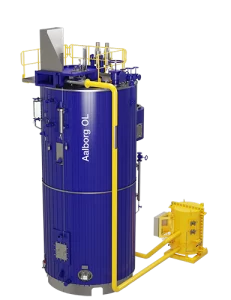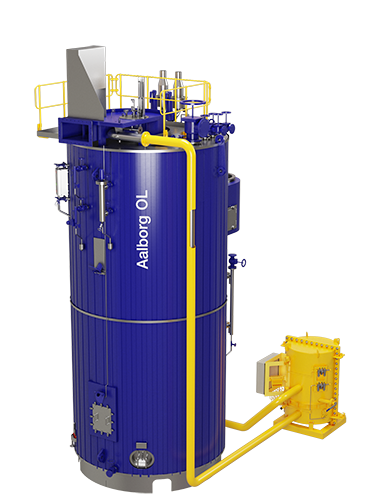
MARPOL Convention Annex VI, established by the International Maritime Organization (IMO), sets limits on sulfur oxide (SOx) and nitrogen oxide (NOx) emissions from ship exhausts, as well as prohibits deliberate emissions of ozone-depleting substances. Marine boilers, as part of the ship’s machinery that burns fuel with potential pollutant emissions, are subject to these regulations.
The key elements that are addressed by the new types of marine boilers in relation to MARPOL Annex VI include:
Fuel Quality Compliance:
Global Sulfur Cap: New marine boilers are designed to operate effectively on fuels that meet the 0.50% m/m sulfur content limit for non-ECA zones and 0.10% m/m for ECA zones. This includes compatibility with various grades of compliant fuels.
Fuel Flexibility: Many new boilers are designed to switch between different types of fuel seamlessly, such as from HFO to MGO, to comply with varying regional regulations, especially when entering or exiting ECAs.
Exhaust Gas Treatment:
Scrubbers: To reduce SOx emissions, new boiler systems can be integrated with exhaust gas cleaning systems (scrubbers), which wash out sulfur compounds from the exhaust gases. These systems come in different types, including open-loop, closed-loop, and hybrid systems, each suitable for different operational needs and environmental regulations:
– Selective Catalytic Reduction (SCR): For NOx reduction, SCR systems are used to convert NOx into nitrogen and water vapor using a catalyst and ammonia as a reductant. These systems are being installed on new ships and retrofitted on existing ones to meet the Tier III NOx standards as required by MARPOL Annex VI for ships operating in NECA areas.
– Exhaust Gas Recirculation (EGR): EGR is another method used to reduce NOx emissions by recirculating a portion of the engine’s exhaust gas back to the engine cylinders. This leads to a reduction in combustion temperatures and, consequently, in NOx formation.
Alternative Fuels:
LNG: As a clean-burning fuel, LNG significantly reduces SOx and NOx emissions and particulate matter. New boilers are being designed to be LNG-capable, which involves modifications to the fuel handling, storage, and burning equipment.
Biofuels: Some modern boilers are compatible with biofuels, which can be carbon-neutral and have lower sulfur content compared to traditional marine fuels. Blends of biofuels with conventional fuels are also being used as a transitional strategy towards more sustainable operations.
Emerging Fuels: Research is ongoing into the use of hydrogen, ammonia, and methanol as potential future fuels for marine boilers. These fuels produce zero or near-zero emissions but require significant design changes and safety considerations.
Improved Combustion Efficiency:
Advanced Burner Design: Modern boilers feature advanced burners that provide more complete combustion, thus reducing the generation of harmful emissions.
Heat Recovery Systems: Heat recovery from exhaust gases is improved in new boiler designs through economizers and waste heat recovery units, increasing overall efficiency and reducing the need for additional fuel burning.
Monitoring, Reporting, and Verification (MRV):
Data Collection and Analysis: Boilers are now often equipped with advanced sensors and control systems that continuously monitor emissions and operational parameters. This data collection is crucial for ensuring compliance and for reporting under MRV requirements.
Record Keeping: Accurate record keeping of fuel consumption and emissions is mandated by MARPOL Annex VI. New boiler systems are integrated with software that facilitates detailed logging and reporting to meet these regulatory requirements, often including automatic data logging to reduce the possibility of human error and provide more reliable and consistent reporting.
The shipping industry is increasingly moving towards compliance with MARPOL Annex VI through the adoption of new technologies and cleaner fuels to reduce air pollution from ships. This shift also aligns with broader initiatives aimed at reducing the global shipping industry’s environmental impact.


I’ve been following this amazing website for the past few days, it serves up great content for viewers. The site owner works hard to engage visitors. I’m a big fan and hope they keep up the good work!